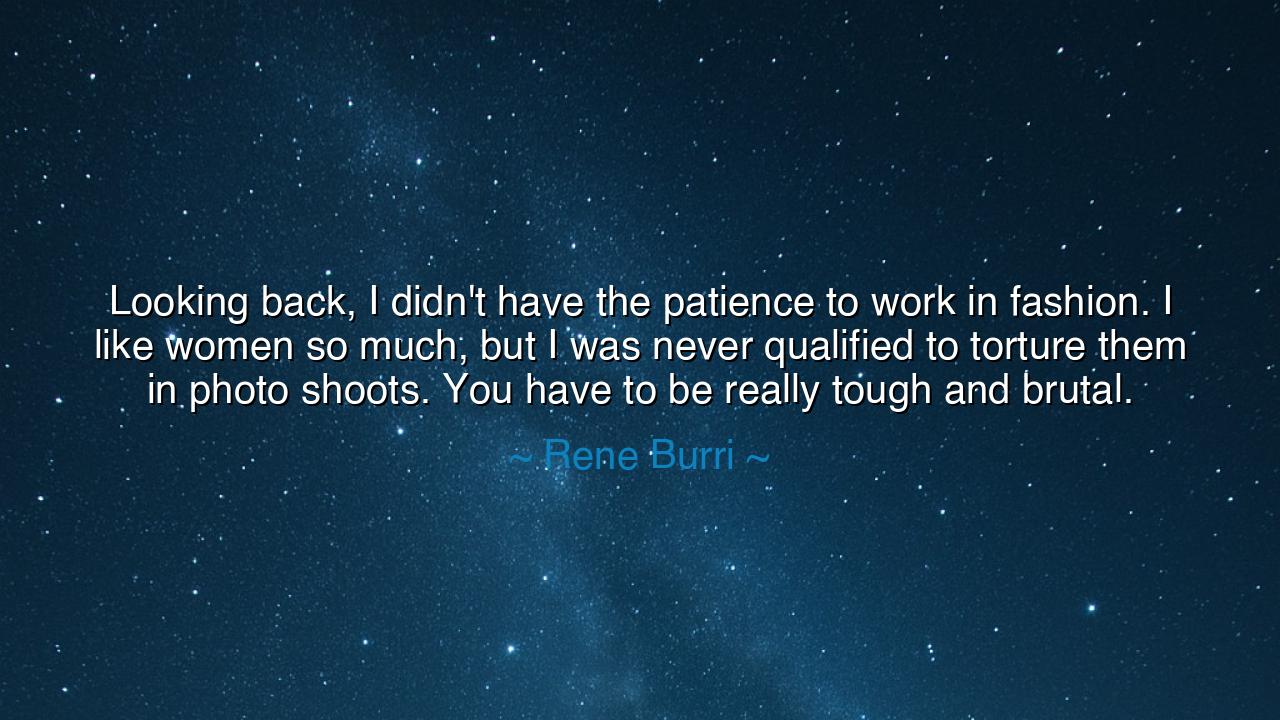
Looking back, I didn't have the patience to work in fashion. I
Looking back, I didn't have the patience to work in fashion. I like women so much, but I was never qualified to torture them in photo shoots. You have to be really tough and brutal.






In the words of René Burri, the master photographer who captured the spirit of the twentieth century, we hear a confession both tender and revealing: “Looking back, I didn’t have the patience to work in fashion. I like women so much, but I was never qualified to torture them in photo shoots. You have to be really tough and brutal.” His statement is not merely about a career path refused, but about the deeper nature of art, compassion, and the choices that define a man’s soul.
For Burri was a witness of worlds in turmoil. He photographed Che Guevara, the ruins of war, the faces of leaders and rebels alike. His eye sought truth, not perfection. In fashion, he found a realm where women were often pushed, bent, and sculpted to fit visions not their own. And though many thrived in this world, Burri admits he could not. He lacked not skill, but the hardness required to bend human beings to an image. This is the essence of his words: that art, to him, must respect its subject, not break it.
In his phrase, “no patience for fashion,” there lies not disdain for beauty, but a refusal of cruelty. For the fashion industry, especially in his time, demanded discipline of a brutal kind—long hours, harsh judgments, and bodies treated as objects of commerce rather than souls. Burri, who “liked women so much,” could not bear to become the architect of their discomfort. He recognized that to succeed there required toughness of heart, a willingness to press forward despite the suffering of others. That was not his way.
History provides us with echoes of this dilemma. Consider the Spartan state, where children were raised in iron discipline, sculpted into warriors with cruelty and rigor. It produced strength, but at the cost of tenderness. Contrast this with the Athenian philosopher, who sought to elevate the mind rather than brutalize the body. Each path produced greatness, but each demanded sacrifice. So too with Burri: fashion offered fame and wealth, but required a hardness he could not embrace, for his art was rooted in humanity, not in domination.
The meaning of his confession is profound: true artistry is not only about what one can do, but also about what one refuses to do. Burri’s greatness lay in his compassion, in his ability to capture people as they were—in their strength, in their weakness, in their truth. To “torture” a woman for the sake of a photograph was alien to his spirit, for his heart was bound to respect and authenticity. His refusal was not weakness, but wisdom, the wisdom to remain true to himself.
The lesson for us is clear: when you choose your path, ask not only what you are capable of, but what aligns with your values. The world may offer opportunities that promise success but demand the sacrifice of your integrity. Like Burri, you must ask: am I willing to become “tough and brutal” for this? If the answer is no, then turn away, not with shame, but with honor, for in refusing, you remain faithful to your true nature.
So let the words of René Burri be remembered: do not measure success only by the doors you walk through, but also by those you choose to leave closed. Hold fast to patience, compassion, and respect for others, even if it means abandoning the paths that promise glory. For the greatest art, and the greatest life, is not built on brutality, but on truth, tenderness, and the courage to honor what you love.






AAdministratorAdministrator
Welcome, honored guests. Please leave a comment, we will respond soon